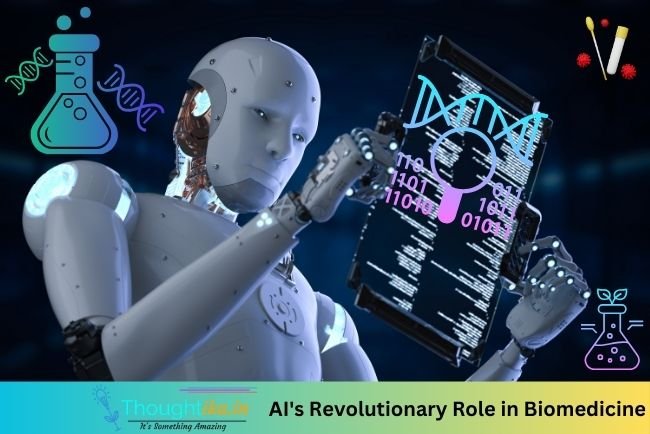AI's Revolutionary Role in Biomedicine: Latest Breakthroughs and Research
Discover how AI is revolutionizing biomedicine. Learn about breakthroughs in protein structure prediction, drug discovery, genetics, and cellular research. Explore the latest research from top universities and institutions.

AI's Revolutionary Role in Biomedicine: The Latest Achievements and Research
In the last year, Artificial Intelligence (AI) has played a pivotal role in transforming the field of biomedicine. Especially in drug development, genetics, and protein structure prediction, AI has not only improved existing processes but has also created entirely new paradigms for medical research and treatment.
AI’s potential in biomedicine is vast, with applications in several areas including personalized medicine, genetic mutations detection, drug discovery, and cell biology. The groundbreaking research driven by AI in these domains showcases its significant impact and promises even greater developments in the near future.
AlphaFold and AI's Impact on Protein Structure Prediction
One of the most revolutionary advancements in biomedicine has been the success of AlphaFold, an AI-powered system that predicts the 3D structure of proteins with unprecedented accuracy. Proteins play critical roles in various biological processes, and understanding their structure is fundamental to understanding how they function. Previously, this process was incredibly time-consuming and complex, often requiring years of trial and error. Now, with AI systems like AlphaFold, researchers can simulate and predict protein folding, which aids in the discovery of how these structures work at a molecular level.
By understanding protein function better, researchers can design more targeted therapies and create more efficient, customized medications. This breakthrough has opened the door to solving some of biomedicine's most difficult questions, helping scientists design drugs that can precisely target the underlying causes of diseases.
AI in Drug Discovery: Transforming the Pharmaceutical Industry
AI's contribution to drug discovery is one of its most notable applications in biomedicine. Traditionally, the process of discovering new drugs is slow and expensive, with clinical trials often taking years to complete. However, with the power of machine learning algorithms, AI can now analyze massive datasets to identify potential drug candidates more quickly. This means that instead of relying on exhaustive testing and random compound screening, AI can make more informed decisions about which drugs to focus on, narrowing down potential compounds to those most likely to succeed.
Moreover, AI can predict the properties of molecules, analyzing factors such as bioavailability, toxicity, and their ability to reach target cells. This results in a faster, more efficient, and cost-effective drug development cycle, ultimately benefiting pharmaceutical companies, healthcare providers, and patients alike.
In addition to discovering new drugs, AI systems can also optimize existing drugs by identifying new ways to use them in treating various diseases. By analyzing molecular interactions and correlating them with the latest clinical data, AI systems have the ability to uncover new uses for established treatments, offering new hope for patients.
AI in Genetics: Accelerating Personalized Medicine
Another remarkable area where AI has shown its potential is in the field of genetics. The complexity of genetic data is enormous, with variations at every level from individual bases in the DNA sequence to entire chromosome-level changes. AI has emerged as a critical tool for extracting valuable insights from this enormous pool of data. By analyzing patterns and correlations in genetic data, AI algorithms are able to identify rare mutations and genetic disorders, accelerating diagnosis and the development of personalized treatment plans.
A key advantage of AI in genetics is its ability to detect specific genetic mutations that may be linked to various diseases. For example, by analyzing a patient's genetic makeup, AI can help detect early signs of conditions like cancer, Alzheimer's, and diabetes. AI-based tools help clinicians better understand the genetic risk factors associated with each patient, enabling more personalized and targeted treatments.
AI Enhancing Stem Cell and Cellular Research
The application of AI in cellular research is also noteworthy. As biologists explore the complexity of cellular behaviors, from growth and differentiation to apoptosis and disease progression, AI plays a crucial role in improving our understanding of how cells behave. Through image analysis, pattern recognition, and big data processing, AI helps researchers discern cellular patterns, predict the outcomes of genetic interventions, and streamline the development of stem cell therapies.
AI-driven tools can also predict how specific cell types will respond to various drug treatments, a crucial factor in advancing research into cellular therapies. For example, AI-powered algorithms can simulate cell behavior in response to genetic modifications or pharmaceutical agents, providing insights into cell differentiation and growth processes. This can assist in developing personalized cell therapies to treat a range of diseases, including cancers and genetic disorders.
AI in Precision Medicine: A Look Toward the Future
AI is playing an increasingly prominent role in the world of precision medicine, which tailors medical treatment to individual characteristics. By harnessing the power of data and algorithms, AI can offer highly specific insights into individual patient characteristics, suggesting the best possible interventions based on their unique biological makeup.
With advancements like the Nobel Prize recognition for computational protein design and structure prediction, the use of AI in precision medicine has received global recognition. This advancement allows scientists to design highly personalized medical treatments by identifying critical biomarkers and understanding the precise ways in which a patient's unique biology will respond to specific drugs.
AI and Biomedical Research in 2024 and Beyond
2024 has marked a significant year for AI’s role in biomedical research, with cutting-edge papers being presented at conferences such as CVPR 2024, ICLM 2024, and ACL 2024, which explore novel applications of AI in biomedicine. The research from top universities and organizations such as MIT, DeepMind, Microsoft Research, and Tsinghua University emphasizes the continuing breakthroughs in understanding AI’s potential to solve complex biological challenges.
The importance of AI has also been spotlighted in major publications like Nature, with global recognition of AI’s role in pushing the boundaries of scientific knowledge and medical innovation.
Conclusion: AI Shaping the Future of Biomedicine
As we move further into 2024, the role of AI in biomedicine will only continue to grow. With achievements in protein structure prediction, drug design, genetics, and cellular research, AI is revolutionizing the way we understand and treat diseases. With each passing day, AI pushes us closer to the future of personalized medicine, where every patient will receive the best possible care tailored to their genetic makeup and individual needs.
For the latest updates on AI’s advancements in biomedicine, refer to platforms like GitHub HyperAI AI+BioMedicine Papers that compile the latest research and papers on the topic.
In conclusion, AI is not just a tool but a transformational force in the realm of biomedicine, promising to unlock deeper insights and redefine the future of healthcare.
What's Your Reaction?
















